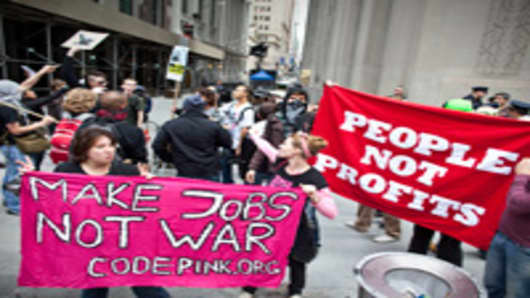Aaron Trask is absolutely correct that many on Wall Street and in the media were too quick to dismiss the Occupy Wall Street protests for reasons that are, largely, aesthetic.
These aren't the sort of people that Wall Street folks or financial reporters are used to taking seriously. Protests haven't really been a part of the Wall Street beat for journalists in decades. So it's taking a bit of time to adjust to the new reality.
But make no mistake. This is the new reality. Occupy Wall Street might not yet be all that potent of a force in politics or society. But it has the potential to become exactly that.
Even though Trask, who works at Yahoo!, takes me to task in his post, I have to say I agree with every part of it.
One critique of the protest is it lacks a unified message or mission.
Indeed, in my reporting I found evidence of people supporting any number of issues, including:
-Higher Taxes on the Wealthy
-Prosecution of Financial Fraud
-Anti-Fracking and other "Green" issues
-Mortgage Modifications
-Campaign Finance Reform
-Anti-War
-Universal Healthcare
-Student Loan Forgiveness and, of course, Jobs, Jobs Jobs
So, sure, maybe the Occupy Wall Street movement is a bit unclear in its views and lacks leadership. But to those who mock the protesters, I have to ask: What exactly is it that you're defending? Crony capitalism? Bank bailouts? Rising income inequality and the slow death of the American dream?
These are indeed what seems to be the main positions inspiring the protesters.
I'd add one more: the protesters are genuinely upset by what they see as the massive collusion of the most powerful people in government with the wealthiest people and corporations in America. They've caught on to the essential truth articulated by my brother Tim Carney in his book "The Big Ripoff." They may not be always articulate this perfectly—often confusing anti-crony capitalism with opposition to markets altogether—but that shouldn't encourage anyone to ignore the fact that Occupy Wall Street is on to something important.
Questions? Comments? Email us atNetNet@cnbc.com
Follow John on Twitter @ twitter.com/Carney
Follow NetNet on Twitter @ twitter.com/CNBCnetnet
Facebook us @ www.facebook.com/NetNetCNBC



